Swimmers warned out of sea after toxic algae find
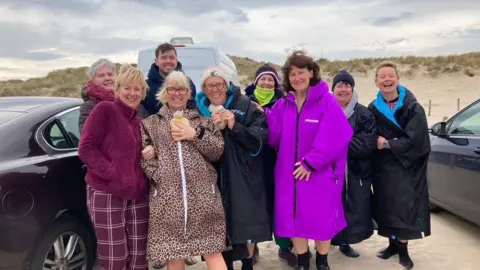 Nicole Morelli
Nicole Morelli Swimmers at Northern Ireland's north coast have said they are "devastated" after two of the area's most popular beaches were red-flagged as unsafe for bathing by the RNLI.
The National Trust said potentially toxic blue-green algae had been found at Portstewart and Castlerock.
Sampling on Wednesday "confirmed" algae at Castlerock and "suspected blue-green algae" at Portstewart Strand.
However, they remain marked as "fully open".
The RNLI red-flag status means bathing is not permitted and people should not enter the water under any circumstances.
Blue-green algal blooms have been detected at a number of sites across Northern Ireland during the recent good weather.
Suspected algae was reported to the Northern Ireland Environment Agency (NIEA) at Castlerock Beach on 5 July by Department of Agriculture, Environment and Rural Affairs (DAERA) samplers undertaking bathing water testing.
It was confirmed as likely to be a potentially toxic species.
Swimmers decamp to other spots
Nicole Morelli from the Menopausal Mermaids, which formed in 2018, said the warning was disappointing, but she recognised it was "safety-first".
"It's devastating - and a bit of a shock - a lot of people rely on it for both physical and mental health - so it's a bit of a blow," she said.
"The water was quite cold this winter so we have been having some lovely swims as the temperature has risen - especially in July - our busiest time of the year with tourists - but again safety is the priority," she added.
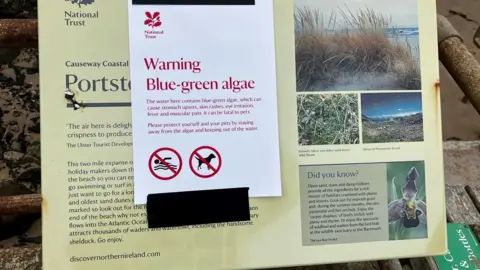
The council and The National Trust were informed and erected signage warning users in the area of the presence of potentially toxic blue green algae.
The NIEA said blue green algae in Lough Neagh has been widely communicated over the past number of weeks and it has now moved downstream with natural flow of water out of the lough through the River Bann, reaching the coast.
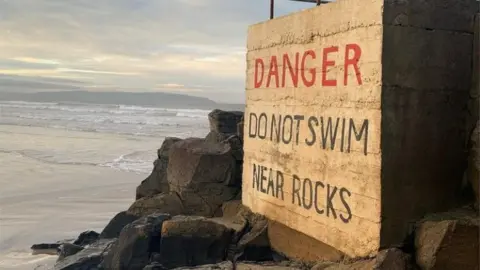
The natural movement of the tides and wave action will break up the algae, with some potentially washing up on the shore.
It can cause illness in both humans and animals, with a number of dog deaths reported.

From the beach
Mike McBride from Portstewart Strand
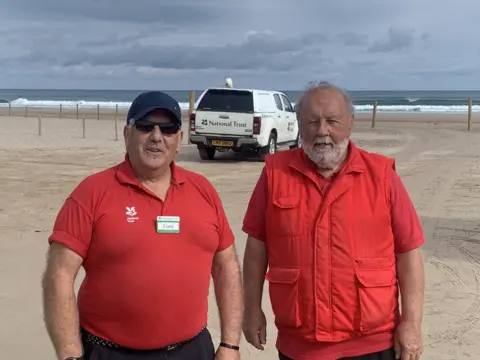
Tony Hawkins and Liam O'Neill are volunteers at The National Trust.
"We have been down very early this morning advising people about the blue-green algae warning and about the risks involved with going in the water," Tony said.
"Some have heeded that advice and some didn't and went into the water anyway - but as volunteers all we can do in our capacity is to advise.
"I think the word has spread to the various sea swimming clubs along the north coast so it's been relatively quiet since about 08:30," he adds.
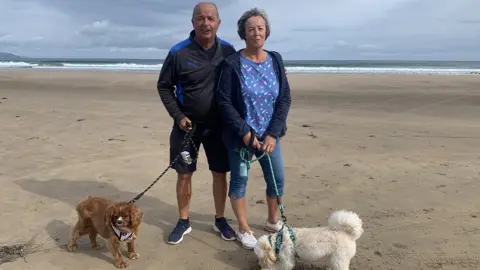
Wife and husband Sandra and Raymond McCoy are caravanning in Portrush.
They said they had some initial concerns about bringing their dogs to the beach.
"Cooper and Maisie love this beach so we brought them down, but kept them on short leashes, far from the water," Sandra explained.
Walk instead of a swim
Jenny Andrews from Holywood, County Down, told BBC News NI she had been in the water on Wednesday when a loudspeaker made the announcement about the algae.
"We were about to leave anyway so the kids weren't too disappointed but myself and my partner love sea swimming and would regularly go for dips.
"I've swapped my wet shoes for walking shoes this morning and I'm going for a walk along the beach instead".

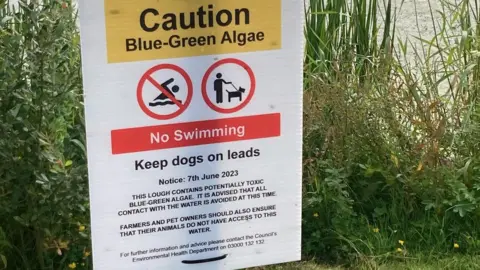
Rising temperatures and pollution create the right environment for an algal bloom to happen.
Notices warning people not to swim in Lough Neagh were posted after the potentially toxic algae was discovered at several locations.
Allow Facebook content?
The NIEA has encouraged people to get involved in citizen science and help monitor the presence of blue-green algae.
The Bloomin' Algae App enables members of the public to submit a photo of the bloom taken on their phone and state what activity takes place at the location, so that the potential risks to people and animals can be gauged.
Members of the public can also report a suspected algae through the incident hotline on 0800 80 70 60 or by e-mail.
The RNLI and DAERA have been asked for a comment.
